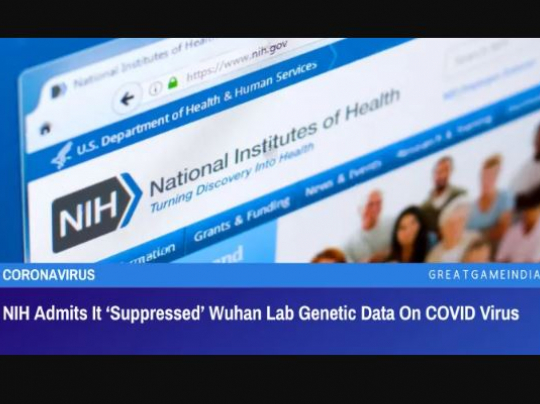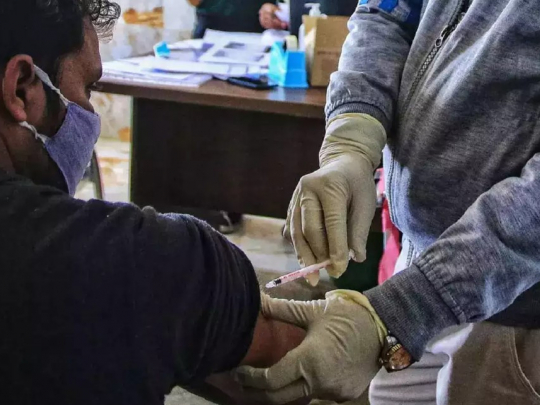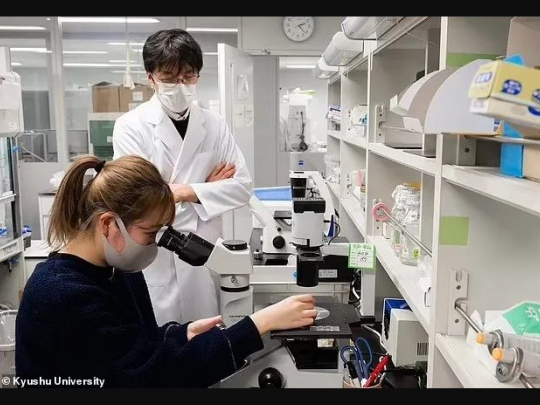NIH Admits It ‘Suppressed’ Wuhan Lab Genetic Data On COVID Virus

A NIH spokesperson denied that the government “deleted” genetic sequencing information on the COVID-19 virus from a Chinese laboratory, however the data was “suppressed,” according to an NIH whistleblower.
“The headline says the sequences were deleted which is inaccurate. They were not deleted. This is a really important point, and I’ve highlighted what did happen from what we provided to you earlier this week,” NIH Media Branch Chief Amanda Fine told The Epoch Times in a March 31 email.
Fine was referencing to a March 29 article titled “NIH Deleted Info Received From Wuhan Lab on CCP Virus Genetic Sequencing, Watchdog’s FOIA Finds.” The following is the information Fine mentioned as having been sent to the media by NIH earlier in the week:
“’In June 2020, in response to a request by the same [Wuhan] researcher, National Center for Biotechnology [NCBI] gave the sequence data the status of “withdrawn,” which removes sequencing data from all public means of access but does not delete them.
“‘NCBI subsequently reassigned the status of the sequence data to “suppressed,” which means that sequence data are removed from the search process but can be directly found by accession number. This action to reassign the data was identified as part of NLM’s ongoing review into the matter. We are working to make more information available,’ the spokesperson said.”
The International Nucleotide Sequence Database Collaboration’s U.S. section is the biotechnology center, which is part of the institute’s National Library of Medicine (NLM).
The previous article piece was triggered by a study released on March 29 by Empower Oversight Whistleblowers and Research (EO), which was based on FOIA responses obtained from the institute.
“On June 5, 2020, a Wuhan University researcher requested that NIH retract the researcher’s submission of BioProject ID PRJNA637497 because of error. The Wuhan researcher explained ‘I’m sorry for my wrong submitting,’” Empower Oversight said in a statement (read below) on March 29.
“BioProject ID PRJNA637497 is also referred to as Submission-ID SUB7554642. Three days later, on June 8th, the NIH declined the researcher’s request, advising that it prefers to edit or replace, as opposed to delete, sequences submitted to the SRA,” EO reported. SRA refers to the Sequence Read Archive (SRA) data resource made available by NCBI, and it “stores raw sequencing data.”
“But then, on June 16, 2020, NIH officials reversed themselves and deleted the genetic sequencing data, as requested by the Wuhan researcher. That researcher was quoted by EO as explaining to NIH: ‘Recently, I found that it’s hard to visit my submitted SRA data, and it would also be very difficult for me to update the data. I have submitted an updated version of this SRA data to another website, so I want to withdraw the old one at NCBI in order to avoid the data version issue.’
“After some discussion about what would be deleted, the NIH concluded the discussion by reassuring the Wuhan researcher that it ‘had withdrawn everything.’”
When asked about Fine’s assertion that the data was not deleted, EO Founder and President Jason Foster told the media that the NIH’s actions guarantee that the COVID-19 virus genetic sequencing information is only accessible to the handful people who have its “accession number,” effectively removing the information from public access and study.
“NIH documents released with Empower Oversight’s report demonstrate that the sequencing data was deleted from public view by the NIH at the request of the Wuhan researcher,” Foster said.
“Our report also details emails between professor Jesse Bloom and the NIH’s Steve Sherry from October 2021 that clearly indicate NIH retained copies ‘for archival purposes.’ Yet the emails demonstrate that NIH refused to share that data in an open, transparent scientific process sought by professor Bloom.
“The NIH should make more information available about each and every time it reassigned the status of sequence data and any information potentially relevant to the origins of COVID-19 should be made available for scientific inquiry.”
Fine didn’t respond when asked who “has access to all of the genetic sequencing information provided by the Wuhan researcher and which was requested by that researcher to be removed.”
The media also asked that because “NIH must know who in fact has accessed the data … who did so and when since the Wuhan researcher requested the information’s removal?”
- Source : GreatGameIndia


















